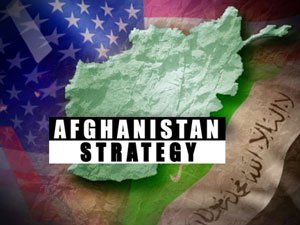U.S. lacks capacity to win over Afghans, experts say
By Gareth Porter | Last updated: May 15, 2009 - 4:54:14 PMWhat's your opinion on this article?
WASHINGTON (IPS/GIN) - President Barack Obama and other top officials in his administration have made it clear there can be no military solution in Afghanistan, and that the non-military efforts to win over the Afghan population will be central to its chances of success.

Graphic: Tamiko G. Muhammad/MGN Online
|
In fact, the U.S. government does not even have a minimum corps of people capable of speaking Pashto, the language of the 14 million ethnic Pashtuns who represent about 42 percent of the population of Afghanistan. It is in the Pashtun Southern and Eastern regions of the country that the complex insurgency that has come to be called the Taliban has been able to organize and often effectively govern at the village level in recent years.
“If all you are going to do is kill the bad guys, then you don't need a lot of Pashto speakers,” said Larry Goodson of the Department of National Security and Strategy at the National War College, who was a member of the team assembled by CENTCOM commander Gen. David Petraeus to formulate a proposal for Afghanistan and Pakistan. But an effort to win over Pashto-speaking Afghans cannot succeed without officials who can communicate effectively in Pashto.
According to Chris Mason, who was a member of the Interagency Group on Afghanistan from early 2002 until September 2005, the Pashtuns of southern Afghanistan are “proto-insurgents,” meaning that they are “naturally averse to the imposition of external order.”
The United States needs “thousands” of Pashto speakers to have any chance of success in winning them over, said Mr. Mason, recalling that 5,000 U.S. officials had learned Vietnamese by the end of the Vietnam War. “The Foreign Service Institute should be turning out 200 to 300 Pashto speakers a year,” he said.
But according to an official at the State Department's Bureau of Human Resources, the United States has turned out a total of only 18 Foreign Service officers who can speak Pashto, and only two of them are now serving in Afghanistan—both apparently in Kabul.
The Defense Language Institute in Monterey, Calif., trains roughly 30 to 40 military personnel in Pashto each year, according to media relations officer Brian Lamar, most of whom are enlisted men in military intelligence.
That indicates that there are very few U.S. nationals capable of working with local Pashtuns on development and political problems. Mr. Goodson said the almost complete absence of Pashto-speaking U.S. officials in Afghanistan “belies the U.S. commitment to a nation-building and counter-insurgency approach.”
It is also emblematic of a broader human resource deficit in regard to a U.S. political approach to counter-insurgency as distinct from the past military approach in Afghanistan, according to Mr. Goodson. Winning over the Pashtun population “requires a level of human capital that, even prior to the global economic crisis, was hard to come by,” Mr. Goodson said, but in his view, “None of that staff is really in place.”
The Washington Post reported that Obama announced in late March that the number of U.S. civilian officials to be involved in the new Afghanistan-Pakistan strategy would be increased by at least 50 percent to more than 900. But even a doubling of the civilian presence would not address the yawning human resource gap in regard to a non-military approach to the insurgency, according to Mr. Goodson.
That's because the additional civilians would be based on a model of “highly paid contractors” who live far from the people they are supposed to be helping to win over, Mr. Goodson explained. That creates friction with their poorly paid Afghan counterparts and does nothing to establish relations with local people, Mr. Goodson said.
“You really do wonder if we are set up to do what we need to do in Afghanistan,” Mr. Goodson said.
Mr. Mason warns that increased U.S. troop strength in Afghanistan is more likely to further alienate the population than help win them over unless the troops are trained for completely different operations from those they have done in the past. “Simply putting in more imperial storm troopers who do not speak the language and who are going to kick in more doors is just going to piss off more people,” he said.
Mr. Mason thinks many Army officers do understand the need to avoid traditional operations aimed at finding and killing or capturing insurgents, but are hamstrung by the Army itself. “The Army needs to move away from its default position, which has been war of annihilation, destroying the enemy, and focus on civil affairs,” Mr. Mason said.
Col. David Lamm, who was chief of staff to the top U.S. commander in Afghanistan from 2003 to 2005, is doubtful about the willingness of the Army leadership to shift to a counter-insurgency strategy in Afghanistan. “The institutional army doesn't want to do this,” he said in an interview last September. “There isn't a lot of money in counter-insurgency. It isn't a high-tech war—it's a low-tech humint (human intelligence) operation.”
INSIDE STORIES AND REVIEWS
-
-
About Harriett ... and the Negro Hollywood Road Show
By Rabiah Muhammad, Guest Columnist » Full Story -
Skepticism greets Jay-Z, NFL talk of inspiring change
By Bryan 18X Crawford and Richard B. Muhammad The Final Call Newspaper @TheFinalCall » Full Story -
The painful problem of Black girls and suicide
By Charlene Muhammad -National Correspondent- » Full Story -
Exploitation of Innocence - Report: Perceptions, policies hurting Black girls
By Charlene Muhammad -National Correspondent- » Full Story -
Big Ballin: Big ideas fuel a father’s Big Baller Brand and brash business sense
By Bryan Crawford -Contributing Writer- » Full Story






 Click Here Stay Connected!
Click Here Stay Connected!








